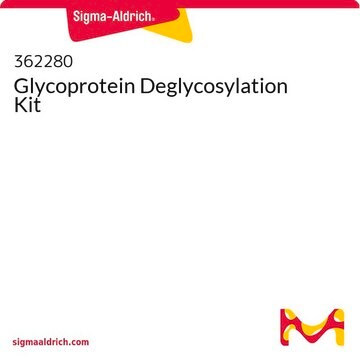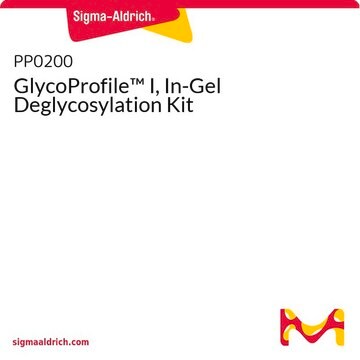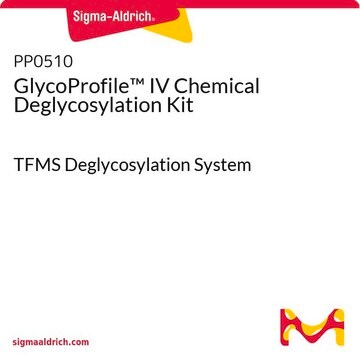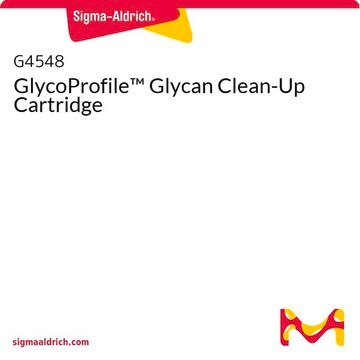PP0201
Glycoprofile™ II, Enzymatic In-Solution N-Deglycosylation Kit
sufficient for 20 samples
About This Item
Recommended Products
storage temp.
2-8°C
General description
Application
Legal Information
Kit Components Only
- 10× Reaction Buffer 1 mL/vial
Kit Components Also Available Separately
- P7367PNGase F from Elizabethkingia meningoseptica, BioReagent, ≥95% (SDS-PAGE), for proteomics 50 USDS
- R7884Ribonuclease B from bovine pancreas, BioReagent, ≥50 Kunitz units/mg protein, ≥80% (SDS-PAGE) .5 mgSDS
- O9882Octyl β-D-glucopyranoside, BioXtra, ≥98% (GC) 100 mgSDS
- M31482-Mercaptoethanol, for molecular biology, suitable for electrophoresis, suitable for cell culture, BioReagent, 99% (GC/titration) .9 mLSDS
Signal Word
Danger
Hazard Statements
Precautionary Statements
Hazard Classifications
Acute Tox. 2 Dermal - Acute Tox. 3 Inhalation - Acute Tox. 3 Oral - Aquatic Acute 1 - Aquatic Chronic 2 - Eye Dam. 1 - Repr. 2 - Resp. Sens. 1 - Skin Irrit. 2 - Skin Sens. 1 - STOT RE 2 Oral
Target Organs
Liver,Heart
Storage Class Code
6.1A - Combustible acute toxic Cat. 1 and 2 / very toxic hazardous materials
Certificates of Analysis (COA)
Search for Certificates of Analysis (COA) by entering the products Lot/Batch Number. Lot and Batch Numbers can be found on a product’s label following the words ‘Lot’ or ‘Batch’.
Already Own This Product?
Find documentation for the products that you have recently purchased in the Document Library.
Customers Also Viewed
Articles
Find deglycosylation kits for your research. Review the different features of deglycosylation kits for glycoproteins, enzymatic proteins, and native proteins.
Find deglycosylation kits for your research. Review the different features of deglycosylation kits for glycoproteins, enzymatic proteins, and native proteins.
Find deglycosylation kits for your research. Review the different features of deglycosylation kits for glycoproteins, enzymatic proteins, and native proteins.
Find deglycosylation kits for your research. Review the different features of deglycosylation kits for glycoproteins, enzymatic proteins, and native proteins.
Protocols
Explore mass spectrometry analysis of glycans for glycomic & glycoproteomic neutral & acidic glycan analysis. See a general mass spec glycan analysis procedure.
Explore mass spectrometry analysis of glycans for glycomic & glycoproteomic neutral & acidic glycan analysis. See a general mass spec glycan analysis procedure.
Explore mass spectrometry analysis of glycans for glycomic & glycoproteomic neutral & acidic glycan analysis. See a general mass spec glycan analysis procedure.
Explore mass spectrometry analysis of glycans for glycomic & glycoproteomic neutral & acidic glycan analysis. See a general mass spec glycan analysis procedure.
Our team of scientists has experience in all areas of research including Life Science, Material Science, Chemical Synthesis, Chromatography, Analytical and many others.
Contact Technical Service













